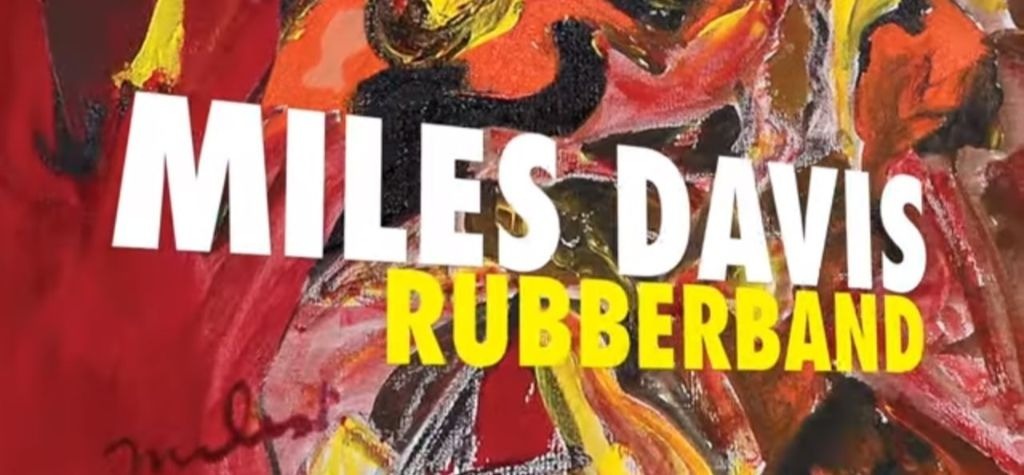|
Getting your Trinity Audio player ready…
|
Recorded mostly in 1985, the height of Miles Davis’ most critically maligned era, Rubberband is unlikely to be appreciated by one who generally disfavors the artist’s 1980s oeuvre. However, for a listener open to Davis’ music from that period, there is much to enjoy.
Full appreciation partly requires an understanding of the album’s history. At the time of recording, Miles had terminated his three-decade association with Columbia Records and was again looking to produce a new sound, which would feature both the most recent technological developments, including increased use of drum machines and synthesizers, as well as concepts from popular music of the time. The work would be more representative of “the street,” full of grooves and funky bass lines. Interestingly, the trumpeter’s voice was also to be used intermittently throughout. There would be planned guest appearances by prominent vocalists of the time, including Chaka Khan and Al Jarreau. Although around a dozen tracks were recorded, the project was ultimately shelved for what would later become Davis’ 1980s masterpiece Tutu.
Nevertheless, Rubberband was always a lingering thought in the Prince of Darkness’ work. Four of the pieces, “Rubberband”, “Carnival Time”, “I Love What We Make Together”, and “Wrinkle”, were often performed during his live performances throughout the late 1980s. Additionally, portions of Miles Davis’ final album, Doo-Bop, relied upon unreleased selections from the Rubberband sessions. Even so, the recording languished for decades. After more than three decades, Warner released an EP in 2018 containing the title track and various remakes of “Rubberband of Life,” both of which are also featured on this most recent incarnation of Rubberband along with nine other songs. While most of the release is derived from the original sessions, it is also not the concept as initially conceived.
Five cuts from the current album – “Paradise”, “Rubberband of Life”, “Emotional”, “Maze” and “Echoes in Time” – do not appear to originate from the original recording sessions. The inclusion of “Maze” is particularly questionable as it actually predates Rubberband and includes a different lineup of performers than the rest of the record. By contrast, three from the recording sessions- “Let’s Fly Away”, “No Time for Showtime”, and “It’s Not a Waste of Time”- do not appear on the new Rubberband. Even for the six songs derived from the mid-1980s sessions, the end result differs from that as initially envisioned as new vocalists were added, new portions remixed, or other changes were made to make the tracks seem more “updated.”
That is not to say that Rubberband is unenjoyable. “Rubberband”, “Give It Up” and “See I See” are funky and interesting. “Echoes In Time/The Wrinkle” begins slowly and subdued before ultimately transitioning into a funky rhythm for the “Wrinkle” portion of the tune. Additionally, despite “This is It”, “Carnival Time”, and “Maze” being stereotypical of Miles’ 1980s music – heavy on synthesizers and electric guitars – they are still great performances.
Where Rubberband generally struggles, however, are the pieces featuring vocalists. With the exception of “Paradise”, these four generally mar an otherwise great album. “I Love What We Make Together” featuring Randy Hall on vocals is by far the worst track on the new release. It sounds both dated and unnecessary. Once intended to have been sung by the late Al Jarreau, its questionable whether even Jarreau’s vocals could have saved this tune.
“Rubberband of Life” partially remixes the title cut and adds in vocals by Ledisi. The bass line sounds better than “Rubberband”, however, Ledisi’s contribution is unnecessary and clutters up the remainder of the track. The very talented Lalah Hathaway sounds great on “So Emotional”. But it downplays the trumpet portion to the point that it seems like it is an ill-placed inclusion on the LP, especially since it was not recorded during the Rubberband sessions.
“Paradise” stands in stark contrast from the other three vocalist-featured works. This is not necessarily because of anything unique about the vocal part, though Medina Johnson’s voice flows nicely throughout the tune. Instead, what makes the song so fascinating is how different it sounds from anything else in Miles Davis’ discography. Featuring a Caribbean influenced beat and acoustic guitar and flute solos, it is an intriguing sound experiment and a worthwhile listen.
For better or worse, Rubberband is probably the closest the public will ever get to the recordings as they were originally intended. While the album has a very heavy 1980s feel to it, it is still very enjoyable and generally worth checking out. While I believe Tutu to be a superior record and the choice to replace Rubberband with the Marcus Miller produced masterstroke likely a sage one, it is still a great thing that Rubberband – or at least this version of it – has seen the light of day.
*The historical portions of this review have substantially drawn upon George Cole’s book The Last Miles, which is heavily recommended for anyone interested in the later years of Davis’ musical career.







Leave a Reply